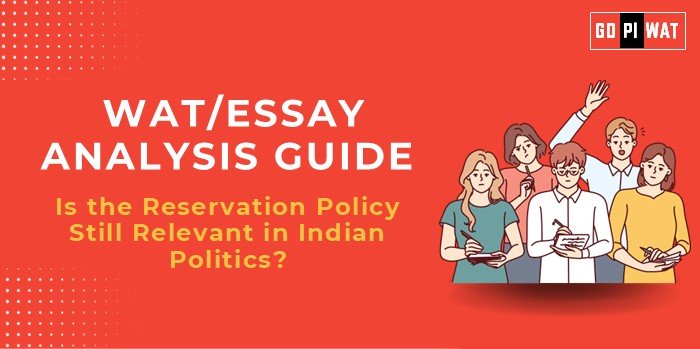🖋️ WAT/Essay Analysis Guide: Is the Reservation Policy Still Relevant in Indian Politics?
🌟 Understanding the Topic’s Importance
The reservation policy has been a cornerstone of India’s efforts to ensure social justice and equity, addressing historical discrimination against marginalized communities. Its relevance extends beyond socio-economic disparities, influencing governance, education, employment, and political representation. This makes it a critical subject for aspiring leaders and policymakers.
📝 Effective Planning and Writing
- Time Allocation:
- ⏳ Planning: 5 minutes (brainstorm key arguments and examples).
- ✍️ Writing: 20 minutes (focus on clear structure and argument depth).
- 🔍 Review: 5 minutes (check for clarity, grammar, and logical flow).
- Preparation Tips:
- 📊 Collect recent data on reservation impacts (e.g., GER, employment stats).
- 📚 Include real-world examples and stakeholder perspectives (e.g., EWS reservation debate).
- ⚖️ Focus on a balanced, data-driven argument.
🎯 Introduction Techniques for Essays
- Contrast Approach:
“While India boasts significant socio-political gains through reservation policies, debates about their relevance persist amid calls for reforms in merit-based selection and economic inclusivity.”
- Solution-Based:
“The reservation policy needs periodic reforms to balance historical justice with contemporary equity, addressing both social disparities and emerging demands for inclusivity.”
🔍 Structuring the Essay Body
- Achievements:
- 🎭 Political Representation: 25% of parliamentary seats reserved for SCs and STs, ensuring their voice in policymaking.
- 📚 Educational Inclusion: Increased Gross Enrolment Ratio (GER) for SCs and STs, though disparities remain.
- 💼 Workplace Diversity: Reservation policies have improved access to government jobs and higher education for underprivileged groups.
- Challenges:
- ⚖️ Creamy Layer Exploitation: Benefits are often cornered by relatively affluent individuals within reserved categories, sidelining the needy.
- ❓ Meritocracy Concerns: Opponents argue reservations dilute merit-based selection, affecting overall institutional efficiency.
- 🌍 Economic Inclusivity: Limited focus on economically disadvantaged groups outside traditional categories.
- Future Outlook:
- ✔️ Economic-Based Reservations: Shift towards economic-based reservations alongside existing frameworks to ensure fairness.
- 📈 Dynamic Frameworks: Develop policies that adapt to societal and economic changes.
💡 Concluding Effectively
- Balanced Conclusion:
“Reservation has bridged historical gaps but needs reforms for equitable and inclusive growth. Addressing the needs of marginalized communities alongside fostering meritocracy is key to a sustainable framework.”
- Global Comparison Conclusion:
“Like affirmative action in the USA, India’s reservation system must evolve to address contemporary societal needs, ensuring inclusivity while fostering progress.”
📊 Analyzing Successes and Shortcomings
- Achievements:
- 🎓 Empowered marginalized groups through increased access to opportunities.
- 🌟 Enhanced workplace and educational diversity.
- 🗳️ Strengthened political representation for underprivileged communities.
- Challenges:
- 🚨 Systemic misuse and benefits skewed towards the well-off within reserved groups.
- 📉 Persistent urban-rural and gender disparities in access to opportunities.
- ⚖️ Polarization in society over meritocracy versus affirmative action.
- Global Context:
- 🇺🇸 USA: Affirmative action focuses on racial diversity and socio-economic equity.
- 🇿🇦 South Africa: Targeted policies for racial equity post-apartheid offer lessons on periodic review and reforms.
🚀 Recommendations for Sustainable Progress
- 🔄 Dynamic Policy Revisions: Use updated socio-economic data to refine reservation criteria and ensure equitable distribution.
- 📊 Periodic Review Mechanism: Institutionalize regular evaluations of the policy’s effectiveness and adjust quotas as needed.
- 💡 Expand Education and Job Opportunities: Increase investment in skill development, particularly for underserved areas and communities.
📚 Sample Short Essays
- Balanced Perspective:
“India’s reservation policy addresses historical inequities but requires reforms to ensure benefits reach the most deserving. A balanced approach can sustain both inclusivity and efficiency.”
- Solution-Oriented:
“Revising reservation policies to focus on economic criteria will ensure inclusivity without diluting merit, addressing both historical injustices and present-day inequities.”
- Global Comparison:
“India can learn from South Africa’s success in targeting racial equity to refine its reservation policies, ensuring they remain relevant and inclusive in a changing socio-economic landscape.”


